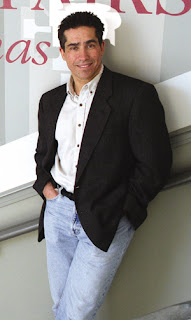Thursday, May 31, 2007

Earlier this year, the head of the Evangelical Theological Society, Francis Beckwith, announced that he'd re-entered communion with the Roman Catholic church.
For many Protestant Evangelicals, this move was tantamount to apostasy, and the uproar over this guy has, at times, been deafening.
This morning an acquaintance forwarded to me an interview with Beckwith where Beckwith talks about some of the reasons he went back to the Church of Rome after so many years away.
It's worth looking at, and I welcome a good discussion around the issues he brings up. Of particular interest to me is his discussion of Justification and his argument regarding the early Church Fathers.
Friday, May 25, 2007
Saturday, May 19, 2007

excerpts from this week's New Yorker....
Anthony Lane on Nicolas Sarkozy: "Awaiting your hero for more than two hours is no hardship to the faithful; standing for two hours without earplugs, however, while the cream of soft Euro-rock is hosed into your consciousness, is another matter."
Norman Mailer on losing his memory as he gets older: "It's awful--I'm absolutely without detail memory now. I keep referring to one metaphor: an old man who's still steering a course is analogous to the captain of an old freighter that may or may not make it to port. You keep throwing ballast overboard. So the hearing goes. The eyesight. The knees. This goes. That goes. ...For a novelist, you really have to retain a memory of how things felt even if you're not reporting them directly. My memory for detals of where something took place, when it happened, is very spotty. What I will remember is the emotional tone of a meeting. Facts you can always lookup somewhere."
And Here is an article worth reading about the growing hysteria over people of faith. I just heard that the new Rush album is all about how bad Christians are for the world. Neil Peart needs to stop reading Hume.
Tuesday, May 15, 2007

Wikipedia. . .democracy in action or Colbert's "truthiness" in action? Both?
For those of you not in the know, Wikipedia generates encyclopedic definitions by way of general consensus. That is, what passes for truth on Wikipedia is none other than the overwhelming opinions of the majority of people who decide to care enough to write and critique the work of others. . . on Wikipedia.
At first blush this sounds like a wonderful idea. Give everyone a shot at defining a topic, and let the rest of the world critique them and argue over what they've said. History, no longer written only by the winner, but also informed by the perspective of the loser! A chance for egalitarian thinking writ large!
Yes. Yes. But wait, how much does the general populace acting as a collective really know anyway? Who's version of the truth are we willing to accept? My experience has been that true democracy of thought often means settling for the lowest common denominator. I think I'm more of an advocate of the free play of the minds of experts than I am the petty infighting of the masses.
Nevertheless, however you come down, Wikipedia raises some interesting questions about the nature of truth, the usefulness of experts in a given field, and the general veracity of a mob.
A few questions that come to mind for me: 1) Is truth nothing more than the consensus of the majority? 2) Is the communication of actual events corrupted more or less with this type of format... as opposed to an encyclopedia of the past? 3) If power was a complaint with regard to the veracity of past texts, what does it say about Wikipedia that Colbert can have all his fans go onto Wikipedia and literally change the definition for a given topic to something completely fallacious?
Monday, May 07, 2007
Thursday, May 03, 2007
Tuesday, May 01, 2007


My new personal goal is to read (in this order) Robert Fagles' translations of Homer's Odessey and Virgil's Aeneid and then move onto Dorothy Sayer's translation of Dante's Divine Comedy. Anyone interested in joining me for some discussion around these three books and how each successive one builds on the other?
Subscribe to:
Posts (Atom)


